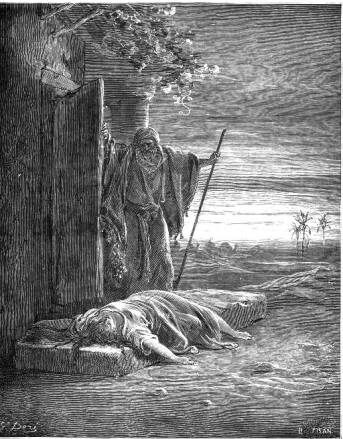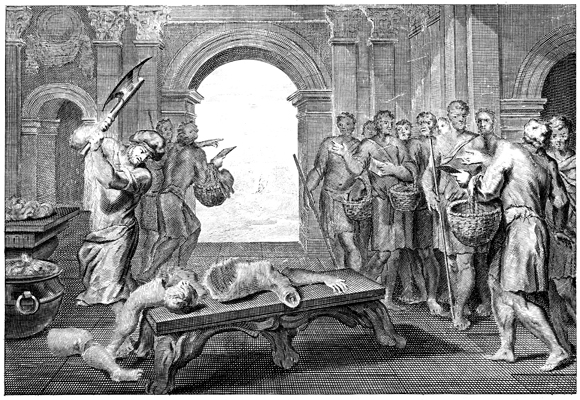Noah's Drunkenness (What did Ham do?)
The story begins with the Flood of Noah, in which God drowned every living thing on earth because "the wickedness of man was great upon the earth" and
the earth was "filled with violence."
God saw that the wickedness of man was great in the earth, and that every imagination of the thoughts of his heart was only evil continually.
And it repented the LORD that he had made man. Genesis 6:5-6
The earth is filled with violence through them; and, behold, I will destroy them with the earth. 6:11-13
It is interesting, and even a bit surprising, that God didn't mention homosexuality in his reason for drowning everyone. It was just general
wickedness, bad thoughts, and violence.
And yet there was some funny business going on just before God announced the flood. I'm not sure what to make of it, but it seemed
to bother God quite a bit.
And it came to pass, when men began to multiply on the face of the earth, and daughters were born unto them, That the sons of God saw the
daughters of men that they were fair; and they took them wives of all which they chose. And the LORD said, My spirit shall not always strive
with man, for that he also is flesh: yet his days shall be an hundred and twenty years. There were giants in the earth in those days; and
also after that, when the sons of God came in unto the daughters of men, and they bare children to them, the same became mighty men which were
of old, men of renown. Genesis 6:2-4
Did you catch all that?
The sons of God impregnated the daughters of men, producing "mighty men." When God saw all this, he said to himself, "I'm not going to
fight with humans anymore because they are flesh. So I'll limit their lifespans to 120 years." (At that time the human lifespan averaged
about 900 years.)1 Then, in the next verse, he decides to drown everything on earth.
So the sons of God/daughters of men thing must have had something to do with the flood. I suppose it bothered God to see
his sons messing around with women. You'd think he could control them better than that. But since the sex in this strange episode was
clearly heterosexual, we'll move on to the rest of the story.
After the flood subsided, Noah sacrificed some animals for God, planted a vineyard, got drunk, and lay naked in his tent.
And Noah builded an altar unto the LORD; and took of every clean beast, and of every clean fowl, and offered burnt offerings on the altar. And the
LORD smelled a sweet savour. Genesis 8:20-21
And Noah began to be an husbandman, and he planted a vineyard: And he drank of the wine, and was drunken; and he was uncovered within his tent.
9:20-21
Noah's son, Ham, entered the tent, saw his father in this condition, and told his brothers about it.
And Ham, the father of Canaan, saw the nakedness of his father, and told his two brethren without. 9:22

Ham's brothers, Shem and Japheth, went into the tent and covered up their naked father without looking at him.
And Shem and Japheth took a garment, and laid it upon both their shoulders, and went backward, and covered the nakedness of
their father; and their faces were backward, and they saw not their father's nakedness. 9:23
When Noah woke up, he (somehow) knew what Ham had done to him, so he cursed Ham's son Canaan,
2 and all of Canaan's
descendants, to be slaves of slaves.
3
And Noah awoke from his wine, and knew what his younger son had done unto him. And he said, Cursed be Canaan; a servant of
servants shall he be unto his brethren. 9:24-25
Noah's curse has provided (and still provides) a biblical justification of slavery.4 But what does it have to do with
homosexuality? That depends on what Ham did to his father, Noah.
If he just looked at his drunken father's nakedness, then we know that God doesn't like it when a son sees his father naked, even when it's
the father's fault. Although if that is the case, then the punishment is more than just excessive, it's psychotic.
But maybe it involved more than that. Chapters 18 and 20 of Leviticus are filled
with warnings about "uncovering the nakedness" of your relatives, including your father.5 And "uncovering the nakedness"
is often Bible-speak for sexual intercourse.6
If that is what is meant in Genesis 9:22, then Ham didn't just see his father naked, he had sex with him. And that,
at least, would make a bit more sense out of the senseless curse in Genesis 9:24-25.
And yet even if that is the correct interpretation of this passage, it is far from clear what to make of it all. Homosexual rape of a father by
his son is not the same as same-sex intercourse in general.
There are also many other ways that this verse has been interpreted. Ham may have mocked or made fun of this father after seeing him naked;
he may have touched or fondled his father's genitals; he may have castrated his father; or he may have had sex not with his father,
but with his father's wife, since according to Leviticus 18:8 and Deuteronomy 27:20,
uncovering the nakedness of one's mother is equivalent to uncovering the nakedness of one's father. This last possibility might explain
why Ham's son, Canaan, was cursed; perhaps Ham's fourth son, Canaan, resulted from the sexual intercourse of Ham and his mother. All of these
possibilities have been suggested by Christian and Jewish commentators.7
Conservatives tend to believe that Ham did more than just look at his father -- he raped him.8 And it was the homosexual
part of it, not the rape part, that bothers them (and God, they figure) the most. God can overlook a rape here or there, as long as it's
heterosexual. That's why he still considered Lot just and righteous9 after he offered his virgin daughters to be
raped10 and later was raped by them.11 Heterosexual shit happens. But when a son
looks at his naked father or has some kind of homosexual sex with him, that's more than God can take. Homosexuality is an abomination to God and
it makes him do crazy things, like destroy entire cities in the case of Sodom, or curse an innocent grandson and all of his descendants with
slavery in the case of Ham.
Conservatives see further evidence for the rape of Noah in the Bible's treatment of the descendants of Canaan -- the Canaanites. The next
chapter of Genesis says that the Canaanites lived in the area of Sodom and Gomorrah.
And the border of the Canaanites was from Sidon, as thou comest to Gerar, unto Gaza; as thou goest, unto Sodom, and Gomorrah.
Genesis 10:19
Here's how Robert Gagnon explains it in The Bible and Homosexual Practice:12
It is, in effect, in the Canaanite blood to be unremittingly evil. Canaanite proclivity to homosexual rape is hinted at by J in
Gen 10:19 when he mentions the fact that the territory of the Canaanites extended as far south as Sodom and Gomorrah....
And the punishment eminently fit the crime (lex talionis). Just as Ham committed a heinous act with his 'seed' (sperm), so too the curse
fell on his 'seed' (son, descendants).
If you have trouble following Gagnon's logic here, I don't blame you. Even if we accept the idea that Ham raped his drunken father, there are a
few question that come to mind:
- Did God make all of the Canaanite people "unremittingly evil"? Are all of their descendants evil today? Do they still have a "proclivity to homosexual
rape"?
- If Ham raped Noah, why didn't God punish Ham?
- Since Canaan had nothing to do with the Ham/Noah incident, how does the punishment "eminently fit the crime?"
- How is a curse transmitted by "seed" (semen)? Is it still being transmitted "by seed" today?
- How did Noah know what happened to him in the tent? And how did he know who did it?
- Since Ham had four sons, why did God select his fourth son (Canaan) to punish?13
Liberal Christians seldom mention this passage, but when they do, it is with disgust. Noah cursed his grandson for something (God knows
what) his son did; an entire tribe (and perhaps race) of people were enslaved because of some unspecified act of their ancestor, and the
guilty person is unpunished. Here, for example, is how Adrian Thatcher puts it in The Savage Text:
Noah's grandson, Canaan, not Noah's son, Ham, is cursed. This is a morally appalling story, a double injustice. Imagine a
grandfather cursing his grandson for his father's misdemeanor (assuming there was one). ... [O]n this text Christians once built the most
horrendous justification for racism and slavery.14
The Levite's concubine
The story is about a Levite (a descendant of Levi) and his wayward concubine, who had "played the whore" against him, running away
to her father's house.
There was a certain Levite ... who took to him a concubine. ... And his concubine played the whore against him, and went
away from him unto her father's house ... and was there four whole months. Judges 19:1-2
So the Levite travelled to her father's house to "speak friendly to her" and retrieve her. When he arrived, her father
rejoiced and greeted him warmly.
And her husband arose, and went after her, to speak friendly unto her, and to bring her again. ... And when the father
of the damsel saw him, he rejoiced to meet him. 19:3
The Levite stayed three days, eating and drinking and having a gay old time.
And he abode with him three days: so they did eat and drink, and lodged there. 19:4
On the fourth day, the Levite decided to leave, but his concubine's father talked him out of it, suggesting that they eat, drink,
and be merry again for just one more night.
On the fourth day ... he rose up to depart: and the damsel's father said unto his son in law, Comfort thine heart with a
morsel of bread, and afterward go your way. And they sat down, and did eat and drink both of them together: for the damsel's father
had said unto the man, Be content, I pray thee, and tarry all night, and let thine heart be merry. 19:5-6
The next day, when they Levite rose to depart, his father in law talked him out of it again. So he stayed there another night.
And when the man rose up to depart, his father in law urged him: therefore he lodged there again. 19:7
On the morning of the fifth day, the Levite tried to leave again, but his host insisted he stay a bit longer and eat a bit more.
And he arose early in the morning on the fifth day to depart; and the damsel's father said, Comfort thine heart, I pray thee.
And they tarried until afternoon, and they did eat both of them. 19:8
Finally, though his host begged him to party with him one more night, the Levite, his two asses, and his concubine departed for the city of Gibeah.
And when the man rose up to depart, he, and his concubine, and his servant, his father in law, the damsel's father, said unto him,
Behold, now the day draweth toward evening, I pray you tarry all night: behold, the day groweth to an end, lodge here, that thine heart may be merry;
and to morrow get you early on your way, that thou mayest go home. But the man would not tarry that night, but he rose up and departed ... to Gibeah.
19:11-14
When they arrived in Gibeah, the Levite decided to camp out in the street, since there was no room in the inn. But an old man saw them and insisted
that they stay with him. So they went ot the old man's house, where they washed their feet, ate, and drank.
And they turned aside thither ... he sat him down in a street of the city: for there was no man that took them into his house to lodging.
And, behold, there came an old man ... and when he had lifted up his eyes, he saw a wayfaring man in the street of the city. ... And the old man said,
Peace be with thee; howsoever let all thy wants lie upon me; only lodge not in the street. So he brought him into his house, and gave provender unto
the asses: and they washed their feet, and did eat and drink. 19:15-21
As they were making their hearts merry, the men of Gibeah knocked on the door, asking the old man to bring out the man that was visiting so
that they could "know him."
Now as they were making their hearts merry, behold, the men of the city, certain sons of Belial, beset the house round about,
and beat at the door, and spake to the master of the house, the old man, saying, Bring forth the man that came into thine house, that we may know him.
19:22
Can't you just picture it? All the men of a city come to a house and demand to have sex with the new guy in town.15
So what did the host do when he answered the door? Well, he offered the mob his virgin daughter (and his guest's concubine), of course! It's the
polite thing to do.
Behold, here is my daughter a maiden, and his concubine; them I will bring out now, and humble ye them, and do with them what
seemeth good unto you: but unto this man do not so vile a thing. 19:24
But the men didn't want the host's virgin daughter, so the Levite gave them his concubine instead.
But the men would not hearken to him: so the man took his concubine, and brought her forth unto them; and they knew her,
and abused her all the night until the morning. 19:25
The men raped her all night; the next morning, she came back to the house and collapsed at the door.
Then came the woman in the dawning of the day, and fell down at the door of the man's house where her lord was, till it was
light. Then came the woman in the dawning of the day, and fell down at the door of the man's house where her lord was, till it was light.
19:26-27
The Levite opened the door, saw the concubine lying there, and told her to get up. But she didn't answer.
And he said unto her, Up, and let us be going. But none answered. 19:28a

So he put her on his donkey and went home.
Then the man took her up upon an ass, and the man rose up, and gat him unto his place. 19:28b
When the Levite arrived home, he cut his concubine into twelve pieces and sent one piece to each of the twelve tribes of Israel.
When he was come into his house, he took a knife, and laid hold on his concubine, and divided her, together with her bones,
into twelve pieces, and sent her into all the coasts of Israel. 19:29

Now that is a strange way to send a message!2 Someone from each tribe of Israel got a rotting piece of flesh
in the mail. What were they supposed to make of that? (Oh, look Martha, here's a stinking hunk of putrefied abdomen that arrived in the mail parcel post!)
When considering this story, it's important to note that there is nothing in this story that indicates that God disapproves of:
- A man having a concubine
- A father offering his virgin daughter to a sex-crazed mob
- Chopping up dead bodies
- Sending messages with body parts
Okay, but what does this story have to do with homosexuality?
Well, did you notice that the Lot-like host offered his own daughter and his guest's concubine to the crowd? He apparently thought
that the heterosexual rape of two women (one being his own daughter) was preferable to the homosexual rape of the stranger who was
lodging with him. And so it seems did the author of Judges and (if you believe in the Bible) God.
Very few believers, if any, can read this story and say to themselves, "Darn, I'm glad this story is in the Bible!" But some conservatives
come close. They use it as even more evidence that God is disgusted by male same-sex intercourse, whether rape or consensual.17
Here, as in the case of Sodom, the desire of the mob to have same-sex intercourse was enough to condemn them.
Liberal Christians view this story as Genesis 19's evil twin, a mythical story that condemns inhospitality and hostility toward visitors.
They deny, of course, that it has any relevance to the homosexuality debate. As Daniel Helminiak said in What the Bible Really Says about Homosexuality:
Judges 19 tells another story that is an obvious parallel to the story of Sodom. ... Clearly, the story of the Levite's concubine is
indifferent to homosexuality or hererosexuality--as is the story of Sodom. ... The people of Gibeah and Sodom are condemned for their meanness,
cruelty, and abuse. Not homosexuality but hardheartedness is the offence of Gibeah and Sodom.18







